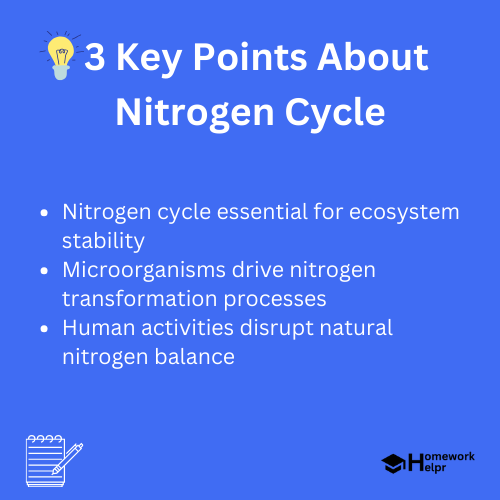📝 Summary
The nitrogen cycle is a critical biogeochemical process essential for the availability of nutrients necessary for living organisms. This cycle includes several key phases such as nitrogen fixation, nitrification, ammonification, and denitrification, which convert nitrogen into various usable forms for plants and animals. Bacteria play a vital role in these processes, with examples like Rhizobium aiding legumes in nitrogen fixation. The nitrogen cycle ensures ecosystem stability, enhances soil quality, and maintains biodiversity. However, human activities, especially agricultural practices, can disrupt this cycle, leading to issues such as soil degradation and eutrophication. Understanding these impacts is critical for sustainable practices.
Nitrogen Cycle: The Essential Journey of Nitrogen in Nature
Nitrogen is a vital element that plays a crucial role in the availability of nutrients needed for the survival of living organisms. The nitrogen cycle is a complex process through which nitrogen in the atmosphere is converted into various forms so that it can be utilized by plants and animals. This cycle is essential for maintaining biodiversity and ecosystem stability, enhancing our understanding of how life flourishes on Earth.
What is the Nitrogen Cycle?
The nitrogen cycle is a biogeochemical cycle that describes the transformations of nitrogen and its compounds in the environment. It includes various processes like nitrogen fixation, nitrification, ammonification, and denitrification. Each process plays a unique role in the conversion of nitrogen from one form to another, making it available for different organisms.
Definition
Biogeochemical cycle: A natural pathway by which essential elements like nitrogen circulate through the ecosystem, involving biological, geological, and chemical processes.
Key Processes in the Nitrogen Cycle
There are several important processes involved in the nitrogen cycle; understanding these will help us appreciate how nitrogen supports life:
- Nitrogen Fixation: This is the first step in the nitrogen cycle. Certain bacteria in the soil and in the root nodules of plants convert atmospheric nitrogen (N2) into ammonia (NH3), a process known as biological nitrogen fixation.
- Nitrification: The ammonia produced during nitrogen fixation undergoes further conversion into nitrites (NO2–) and then into nitrates (NO3–) by nitrifying bacteria present in the soil.
- Ammonification: When organisms die or excrete waste, their nitrogen-containing compounds decompose, releasing ammonia back into the soil. This process is carried out by decomposers such as fungi and bacteria.
- Denitrification: In anaerobic conditions, denitrifying bacteria convert nitrates back into nitrogen gas (N2), completing the cycle. This nitrogen then re-enters the atmosphere.
The Role of Bacteria in the Nitrogen Cycle
Bacteria are the unsung heroes of the nitrogen cycle. Without these microorganisms, the processes of nitrogen fixation, nitrification, and denitrification would be severely hindered. They help maintain a balance of nitrogen levels in the soil, ensuring that plants can absorb it efficiently.

For example, Rhizobium is a type of bacteria that forms a symbiotic relationship with legumes. They help in fixing nitrogen, which is then used by the plants for growth. In return, the plants provide carbohydrates to the bacteria as a source of energy.
Definition
Symbiotic relationship: A close and long-term interaction between two different biological species, often beneficial to both.
Importance of the Nitrogen Cycle
The nitrogen cycle is vital for several reasons:
- Nutrient Supply: It provides essential nutrients for plant growth, which form the basis of food chains.
- Ecosystem Stability: Ensures that nitrogen levels remain balanced within ecosystems, supporting diverse plant and animal life.
- Soil Quality: Enhances soil fertility by converting nitrogen into forms plants can use, promoting healthy crops.
💡Did You Know?
Did you know that approximately 78% of the atmosphere is made up of nitrogen? However, it is not directly usable by most organisms without first being converted into another form.
Human Impact on the Nitrogen Cycle
Human activities have significantly altered the nitrogen cycle, primarily through agriculture and industry. The excessive use of nitrogen-rich fertilizers can lead to problems such as:
- Soil Degradation: Overuse of fertilizers can harm soil microorganisms and disrupt the balance of the nitrogen cycle.
- Eutrophication: Runoff from fertilized fields can lead to nutrient-rich waters, causing algal blooms that deplete oxygen levels in water bodies.
- Air Pollution: Nitrous oxide (N2O), a greenhouse gas resulting from agricultural practices, contributes to climate change.
Effects of Climate Change on the Nitrogen Cycle
Climate change also affects the nitrogen cycle. Changes in temperature and precipitation patterns can influence nitrogen availability and transformation rates in the soil. For example:
- Increased rainfall can cause nitrogen to leach from the soil, leading to lower availability for plants.
- Higher temperatures can accelerate the rate of decomposition, potentially releasing more nitrogen into the atmosphere.
Example
For instance, during heavy rainfall, nitrogen-containing fertilizers can wash away from agricultural fields into nearby waters, causing eutrophication, where algae grow excessively and reduce oxygen levels in water.
Conclusion
The nitrogen cycle is an essential process that not only supports life but also maintains ecosystem health. It is fascinating to see how nitrogen transforms and moves within the environment, driven by microorganisms that play critical roles. As future stewards of the Earth, understanding how our actions can affect this cycle is crucial. By practicing sustainable agriculture and being mindful of nitrogen use, we can help protect this vital cycle and ensure a thriving planet for future generations.
Related Questions on Nitrogen Cycle
What is the nitrogen cycle?
Answer: The nitrogen cycle is a biogeochemical cycle that describes the transformations of nitrogen and its compounds in the environment, including nitrogen fixation, nitrification, ammonification, and denitrification.
Why is the nitrogen cycle important?
Answer: It is essential for nutrient supply for plants, ecosystem stability, and maintaining soil quality, which supports diverse life on Earth.
How do human activities affect the nitrogen cycle?
Answer: Human activities, especially through agriculture, can lead to soil degradation, eutrophication of water bodies, and increased air pollution from nitrous oxide.
What role do bacteria play in the nitrogen cycle?
Answer: Bacteria are crucial as they facilitate processes like nitrogen fixation, nitrification, and denitrification, converting nitrogen into forms usable by plants.
